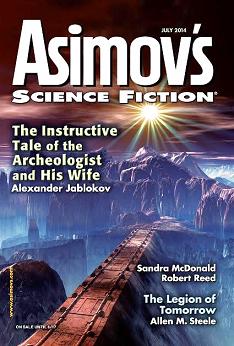 Asimov s, July 2014
Asimov s, July 2014
Reviewed by Clancy Weeks
The Legion of Tomorrow by Allen M. Steele is a cute tale of the early development of the Futurian movement in SF, interspersed with a soap opera and the beginnings of the more pragmatic and completely fictional Legion of Tomorrow. While it takes a long time to get to the point—and what defines Science Fiction—we are treated to a history of everything from the Golden Age of SF to the Manhattan Project through chance meetings with real-life notables. The whole thing has a Forrest Gump feel—the movie, not the book—but that only adds to the charm. The ending is clear a mile away, but by then it doesn’t matter. I found myself performing online searches to learn more about each event the second I finished the story. I have always felt this to be a central mission (one, at least) of SF—to raise new questions in the act of answering others. Good stuff.
Robert Reed, in his story of dark and light, “Blood Wedding,” channels the best of H.G. Wells with his own versions of Morlocks and the Eloi. While this is neither a retelling of The Time Machine, nor is it a true reimagining, it is instead a story revolving around such concepts as duty, honor, and the individual’s proper place and function in a practical society.
In “The Instructive Tale of the Archeologist and His Wife” by Alexander Jablokov we have a story about an archaeologist. That’s it. I kept waiting for some action to occur, but there never was any. Sure, the man in question has come, by the end, to realize that his whole profession was based on a lie. Or something. I have to admit I didn’t really get this story. I’m sure it’s actually very good—after all, the editor at Asimov’s obviously thought so. I just don t see it.
I have an affinity for stories that take current events and project them into the future to see how things turn out. “Five Six Seven” covers a lot of ground—megacorporations, health insurance, our dependence on technology and our growing reliance on cloud computing and data connections—but Evan Fuller manages to bring it all together. This is the first in what is to be a series of stories set in the near future, and it feels like a very good start. There are mysteries to be solved, but the solutions have to wait for later installments. The central character, Doreen, is both likeable and flawed—not just physically, but emotionally as well. I hope to read more of her soon.
Where do stories come from? Barry Longyear would say Schenectady, but Sandra McDonald offers up a simple recursive theory in “Story of Our Lives.” Three college friends discover that each has a gift, and one gift leads to the creation of every great movie since the 80s. This is a charming tale told as family history to a young man coming of age.
Like any virus, the infection begins slowly, but the effect is inevitable. Injecting a woman from the past into a far-flung future, Karl Bunker predicts similar outcomes in “The Woman from the Ocean,” and shows that whatever is wrong with humanity is also what is right with it. Thought-provoking and well-crafted.
Short-shorts are hard to do well, but M. Bennardo’s “How Do I Get to Last Summer from Here?” is well done, indeed. A time-of-your-life travel story with a novel, if depressing, ending. Who doesn’t have a hook in their life?
Clancy Weeks is a composer by training, with over two-dozen published works for wind ensemble and orchestra, and an author only in his fevered imagination. Having read SF/F for nearly fifty years, he figured “What the hell, I can do that,” and has set out to prove that, well…maybe not so much. He currently resides in Texas, but don’t hold that against him.